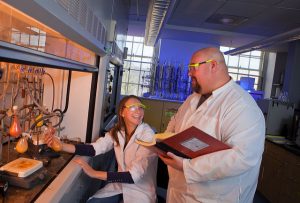Improving Inorganic Chemistry Education
 Inorganic chemistry is a diverse field covering topics such as making new materials, developing new catalysts and understanding the roles of metals in biological systems. Inorganic chemistry is critical to solving many STEM-related societal issues. Improving student learning and interest in inorganic chemistry is a national imperative. Supported by a five-year, $1.11 million National Science Foundation grant to the Interactive Online Network of Inorganic Chemists (IONiC), a team of inorganic chemists which includes Professor Nataro, will be instructing faculty world-wide on teaching strategies that engage and inspire students to continue in STEM.
Inorganic chemistry is a diverse field covering topics such as making new materials, developing new catalysts and understanding the roles of metals in biological systems. Inorganic chemistry is critical to solving many STEM-related societal issues. Improving student learning and interest in inorganic chemistry is a national imperative. Supported by a five-year, $1.11 million National Science Foundation grant to the Interactive Online Network of Inorganic Chemists (IONiC), a team of inorganic chemists which includes Professor Nataro, will be instructing faculty world-wide on teaching strategies that engage and inspire students to continue in STEM.
Titled “Collaborative research: Improving inorganic chemistry education through a community-developed student-centered curriculum,” the project will improve teaching and learning in inorganic chemistry by leveraging an established community of practice to develop a modular framework for teaching inorganic chemistry grounded in active learning practices. New curricular materials based on the latest advances in inorganic chemistry research and accessible at the level of the undergraduate classroom will be developed and shared via the curricular repository VIPEr (the Virtual Inorganic Pedagogical Electronic Resource, www.ionicviper.org), IONiC’s website.
“We are helping faculty, both fresh from graduate school and those with more experience, develop new methodologies to help engage students in their courses,” says Nataro, one of the “pit-vipers” (leadership group) that develop and disseminate best practices for teaching inorganic chemistry. “The project will also continue to develop teaching materials that can be used in classrooms around the world.”
The Interactive Online Network of Inorganic Chemists (IONiC) was founded as a community dedicated to advancing inorganic chemistry education. It is organized and directed by a leadership council comprised of 11 faculty at primarily undergraduate institutions across the United States. Three of the principal activities of IONiC are VIPEr, annual workshops focused on training faculty and research symposia held at the annual spring meetings of the American Chemical Society.
The annual workshops bring together faculty members, graduate students and facilitators to focus on inorganic chemistry. Faculty are introduced to recent high-impact research and develop teaching materials on the topic. A main focus is the incorporation of peer-reviewed primary literature into the undergraduate curriculum. These teaching materials are hosted on the VIPEr website.
VIPEr is a digital library and virtual community for sharing teaching materials, advice and evidence of student learning with more than 1,000 registered faculty users from six continents. Materials on VIPEr are available as discrete “learning objects” (LOs), small pieces of curricular material adaptable to different classroom situations. LO types include classroom and laboratory activities, literature selections suitable for in-class discussions, short presentations on special topics, and problem set and exam questions. Many LOs emphasize active learning, student inquiry, and require higher-order thinking, including analysis, synthesis and evaluation.